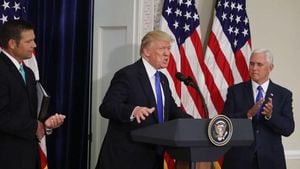Fact-checking and misinformation have become commonplace topics surrounding U.S. elections, with the 2024 presidential race amplifying discussions about the reliability of various claims made by public figures. From high-profile politicians to social media influencers, misunderstandings and flat-out misinformation can sway public perception and influence voter behavior, bringing the importance of fact-checking to the forefront.
A recent incident involved CNN anchor Jim Acosta, who made claims asserting President-elect Donald Trump did not win the popular vote, declarations swiftly met with rebuff from his peers during live broadcasts. Acosta stated, "He is claiming a popular vote victory which did not occur," only to be corrected by CNN political director David Chalian, who noted, "Obviously, there are still a million plus, maybe two million votes to count out of California." Chalian hinted at the potential for Trump to maintain his popular vote lead as counting progressed.
This back-and-forth highlights the perilous dance of commentary and fact-checking reigning over explosive election narratives. With allegations against electors, vote counting confusion, and many complex claims swirling around, it’s clear voters need reliable sources to clarify the truth. The role of organizations like PolitiFact, which analyzes statements made by public officials, is more important than ever. Their work ensures the electorate has access to clear facts, dissecting claims to reveal their legitimacy.
More broadly, social media platforms have had to grapple with the challenge of misinformation spreading like wildfire across their networks. The May blowback against Elon Musk’s restructured moderation process on X (formerly Twitter) serves as another example. The platform revamped its Community Notes feature, allowing crowdsourced fact-checks on potentially misleading tweets. Yet, analysis shows only 29% of fact-checkable tweets included helpful notes, raising questions about the efficacy of crowd-sourced efforts amid high-stakes misinformation.
Delving deep, analysts studied 3,637 notes generated on Election Day, focusing on claims about the U.S. election. To their chagrin, of those, only 55 were deemed genuinely fact-checkable, with just 24 rated useful. Alex Mahadevan and alumni from Poynter noted, "Only 29% of the fact-checkable tweets were found helpful," calling the initiative more of a theoretical success than practical utility.
Parties across the board have seen increasing scrutiny as they make their claims and assertions. For example, during another incident where former House Speaker Nancy Pelosi mentioned on national television stating "fewer people came under President Biden than came under Donald Trump," PolitiFact rated her claim false. The fact-check revealed evidence pointing to at least four times as many migrants being apprehended during Biden's tenure compared to Trump’s presidency.
Pelosi was quick to cite her references to deportations, but PolitiFact noted only so much time can shift focus from the substantial numbers. The larger issue here was clear: politicians’ words immediately carry weight, viable enough to impact legislative focus or even judicial reviews.
Even misinformation carried through celebrity culture found traction. While analyzing false allegations circulating via platforms like TikTok, one rumor claimed Trump’s name surfaced 312 times within the Project 2025 initiative documentation, tying him closely to its proposals. Snopes uncovered the truth: rhetoric and naming conventions are often mischaracterized. A handful of those instances represented administrative references rather than personal mentions.
The ramifications of misinformation don’t end within the hallowed walls of politics. Businesses, social movements, and community structures have been turned on their heads as trust within systems disperses. The need for undeniable accountability is palpable. Falsehoods such as misleading campaign advertisements or completely fabricated news reports have made their way across channels, and organizations like the International Fact-Checking Network (IFCN) offer platforms for transparency.
The mission? To promote vibrant civil discourse leveraging ethical journalism and clear-cut claiming systems.
Among organizations combating misinformation, MediaWise, another offshoot of Poynter, strives to lift the veil. Through educational resources and workshops, the focus now extends to demystifying advanced issues surrounding fact-checking and media literacy, hoping to arm users with skills to question sources themselves.
Looking beyond party lines, it’s notable how fact-checking entities have urged individuals to undergo media literacy training to safeguard against misrepresentations. During this election season, narrative control remains more potent than ever, leaving analysts scrambling to dissect the truth behind politicians' rhetoric.
Lastly, as election day approaches, voters will undoubtedly face advancing levels of misinformation. Reminders of events surrounding recounts—one where one candidate is hoping to overturn outcomes after losing by over 30,000 votes—will place additional pressure on fact-checkers and organizations alike. These recounts rarely swing more than just handfuls of votes. The costs—in human capital, credibility, and tax dollars—are sometimes more remarkable than the outcomes they seek to change.
This brings us back to the role of accurate reporting against waves of potential misinformation; it’s more than just about making headlines. Each bit of false information can tip the scales during elections, impacting community-level decisions down the line. With resources like PolitiFact, FactCheck.org, and MediaWise, getting accurate information and asserting claims confirms democracy, enables accountability, and enforces the truth. The future of elections needs it more than ever.



